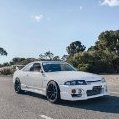Best ecu for r33 gtst?
Announcements
-
Similar Content
-
Latest Posts
-
Given by the sheer number of questions about offset, absolutely not. If you had the information formatted this way: Space from R34 GTT hub to outer arch = 100mm Space from R34 GTT inner hub to nearest suspension arm = 90mm. (making this up) Buying a wheel that was advertised as Enkei RPZ5 Diameter 18in Width 9 Distance to arch = 84mm Distance to suspension arm = 76mm 100% of people would know instantly if it fits. They would absolutely also know instantly how close it fits too, and no questions would need to be asked. You would know you would have 16mm from the guard and 14mm from the suspension arm.
-
Ah ok, for example for the apexi ecu I heard that it's pretty limited with the information it can give you. Also not sure why Nissan used the consult port over the obd2, what the idea there was.
-
Diagnosing with and without is mostly the same. You need to know, as Duncan asked, and what conditions. Car hot, cold, idling, driving, if while driving what rpms, is when you're varying, or is it when held constant. From there it's understanding what can be causing it. Starting with pretending all of the sensors are correct. Which means if it's going rich, why would it be thinking more air is going in than it is, and under what conditions. So things like if only when under boost, it could be be a loose intake piping joint. It's just understanding the system, and understanding when/how the problem occurs, and then if it's only occuring in specific scenarios, what can be causing it. ECU specifically, if it's aftermarket, it'll have software you can use, for the Skylines on factory ECU, there is Nissan Consult you can use. Most ECUs have a way to get data from them.
-
How do you go about diagnosing ecu's that don't have data logging, is it more experience at that point and just trying out things that you think will fix the issue?
-
Stock O2 are basically useless beyond anything at stoich. Any misfire will also be seen as lean. The stock O2 also read a collective exhaust gas volume, not each cylinder. Sputtering and missing means not each cycle is firing, and some are. Which means even if rich, as shit, on cylinders as they miss, they'll read lean, but the cylinders that did fire will read rich, and combined, well, they can read anything from rich to lean. Start with the basics before even going looking at sensor values. Edit: I say the above, and that's coming from the guy with a few thousand dollars worth of scan tools sitting right beside me right now that I use frequently for my job.
-







Recommended Posts
Create an account or sign in to comment
You need to be a member in order to leave a comment
Create an account
Sign up for a new account in our community. It's easy!
Register a new accountSign in
Already have an account? Sign in here.
Sign In Now